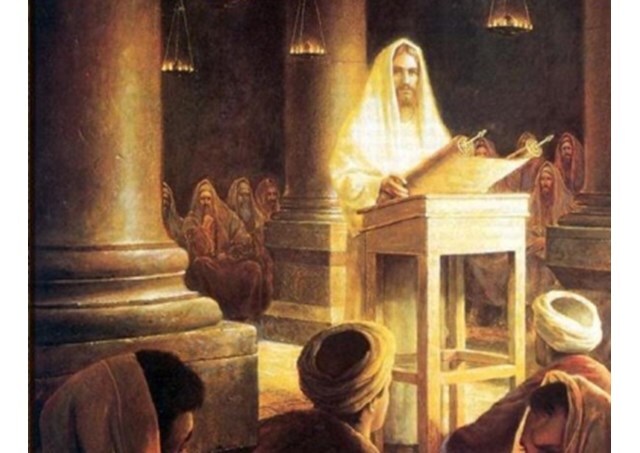
First Reading Jeremiah 1:4-5,17-19
The Lord assures Jeremiah that he will deliver him from all who fight against him.
Responsorial Psalm Psalm 71:1-2,3-4,5-6,15,17
A song in praise of God's salvation
Second Reading 1 Corinthians 12:31—13:13 (shorter form, 1 Corinthians 13:4-13)
Paul describes love as the greatest of virtues.
Gospel Reading
Luke 4:21-30
Jesus is rejected in his hometown of Nazareth.
Background on the Gospel Reading
This Sunday we read from the Gospel of Luke, continuing immediately from last week's Gospel. Recall that in last Sunday's Gospel, Jesus read from the prophet Isaiah and announced that this Scripture was now fulfilled. In today's Gospel, we learn that the people of Nazareth are impressed by Jesus' words, and yet they seem surprised. They still think of Jesus as merely Joseph's son. They do not expect such words from someone they believe that they know.
This Gospel is about who Jesus is and who people believe him to be. The story of Jesus' preaching and rejection at Nazareth is found in each of the Synoptic Gospels. In Luke's Gospel, this incident is told in a way that foretells Jesus' passion and death and helps explain the inclusion of the Gentiles in the promise of salvation. In Luke's Gospel this incident appears at the beginning of Jesus' ministry; in Matthew and Mark, this event is placed considerably later, after Jesus has preached and taught elsewhere. Only Luke identifies the content of Jesus' teaching in any detail, telling us that Jesus read from the book of the prophet Isaiah in the synagogue. In Mark and Matthew's Gospels, Jesus teaches in the synagogue in Nazareth, and the townspeople take offense because Jesus is only the son of a carpenter. They reject his authority to teach them. In Matthew and Mark, it is only after Jesus is rejected that he observes times when Israel has rejected prophets.
In Luke's Gospel, the people are surprised but not immediately offended by Jesus' words in the synagogue. It is the words that follow his reading from the prophet Isaiah that seem to offend them. Jesus challenges and provokes the people of Nazareth by referring to examples in which Israel rejected the prophets. He also challenges them to respond to his message, the message of a prophet, in a way that is different from their ancestors. This call for a new response leads to his rejection.
It is helpful to consider the historical context of Luke's Gospel. Luke has witnessed the acceptance of the gospel message among many Gentiles. He endeavors to explain why the Good News of Jesus has not been as well-received by his Jewish contemporaries. Luke's report interprets the cause of Jesus' rejection at Nazareth in the context of this later Christian history. Just as the people at Nazareth did not welcome the Good News that Jesus announced, so too many among the people of Israel will not accept the preaching of the gospel.
After Jesus' words of challenge, Luke reports that there was a movement to kill Jesus by throwing him over a cliff. This differs from the reports found in Mark and Matthew's Gospels, where Jesus is said to be unable to perform miracles in Nazareth because of the people's lack of faith. Luke says that Jesus walks away from the crowd that intended to kill him; it is not yet his time. The animosity of the people of Nazareth prefigures and prepares the reader of Luke's Gospel for the cross. Luke wants all to understand that it is through his death on the cross that Jesus offers God's salvation to all.
No comments yet. Be the first to say something!